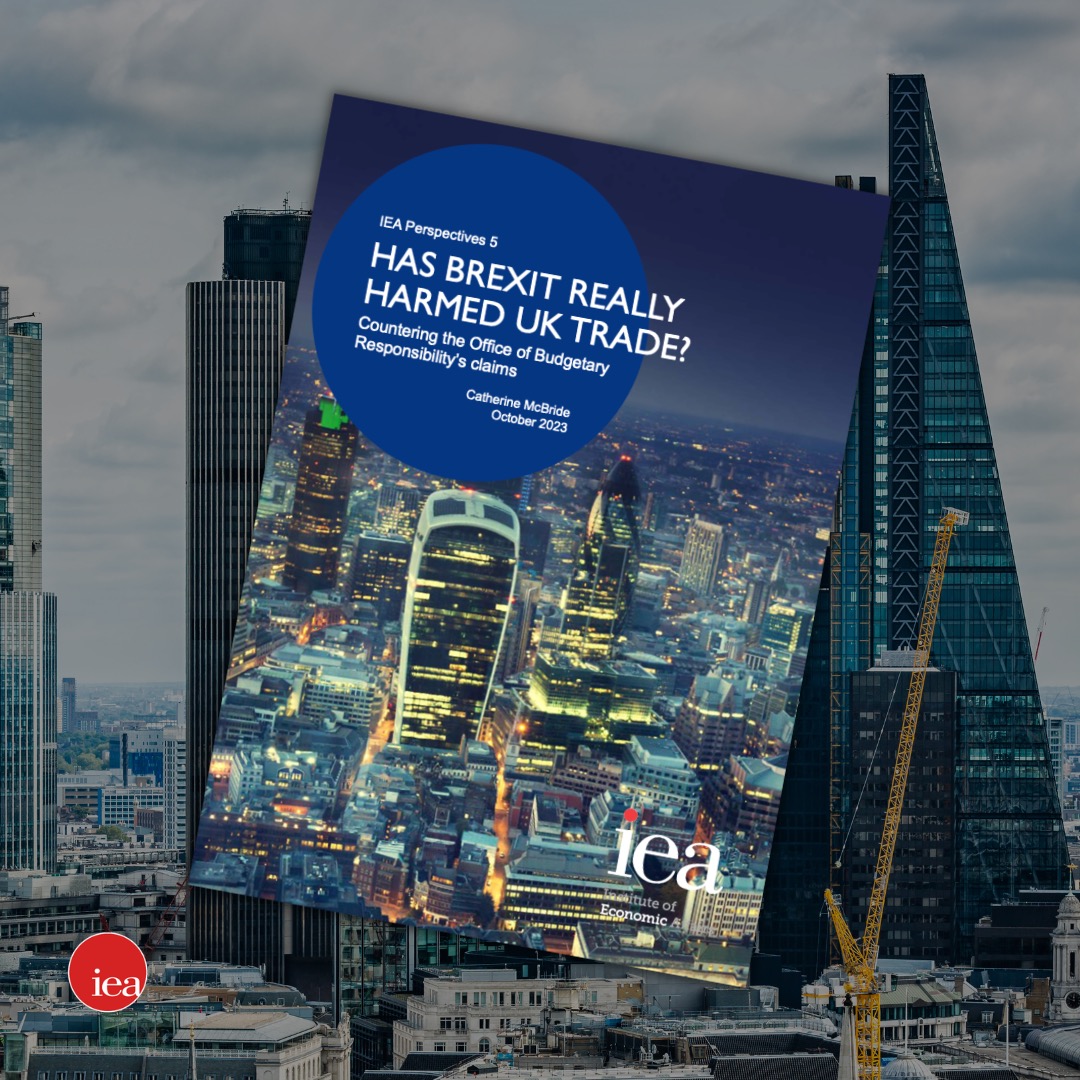Bank of England not necessary, says landmark IEA ‘free banking’ book
SUGGESTED



- Central banks have consistently failed to keep down inflation and ensure financial stability.
- There have been at least sixty historical episodes of free banking, ranging from several years to over a century.
- Scotland, France, and the antebellum United States, among many other examples, demonstrate the possibility of economic development without a central bank.
- The Experience of Free Banking includes chapters authored by over a dozen leading international academics in economic and monetary history.
The Bank of England’s failure to control inflation following the Covid-19 pandemic has prompted widespread calls for reform. A new book from the free market think tank the Institute of Economic Affairs goes further by challenging the conventional wisdom that central banks are even necessary.
The Experience of Free Banking outlines a monetary system where private banks issue competing banknotes, usually anchored to a commodity like gold or silver, replacing the central bank’s role. This approach empowers the public to choose or discard a bank’s currency, promoting a competitive and stable banking environment.
“The historical record shows that free banking is not prone to inflation, does not produce banking instability and does not produce a banking monopoly,” says book editor Kevin Dowd, Professor of Finance and Economics at Durham University Business School. “These are big pluses. Plus if it worked in the past, then there is every reason to think it would work again in the future.”
The book comes as Argentina’s new President Javier Milei has pledged to abolish the country’s central bank following triple-digit inflation and decades of monetary mismanagement.
Between 1716 and 1845, Scottish banks issued competing banknotes secured to fixed quantities of precious metals like gold or silver with few government restrictions on the sector. Scotland’s free banking period delivered stability, low inflation, and economic growth.
Adam Smith, in The Wealth of Nations, highlighted the significant role played by Scottish banking in the country’s economic development. Scotland’s per capita income increased from half of England’s in 1750 to nearly equal by 1845.
Scottish banks over this period failed at half the rate of England’s, demonstrating the system’s stability. It also delivered innovations such as extending bank branches, interest payments on deposits and an early form of overdraft.
Scotland’s successful period under free banking contrasts with the record of the Bank of England, which has played a central role in multiple economic crises, episodes of financial instability and inflation. Economist Kurt Schuler, a chapter author, writes “that London was the storm centre of so many eighteenth- and nineteenth-century panics suggests that the Bank of England’s effect on the world financial system may have been detrimental.”
Kevin Dowd, Editor and co-author, and Professor of Economics at Durham University Business School said:
“The experience of free banking shows that the root problem lies not with the markets, but with government interference in financial markets, starting first and foremost with the government setting up a pet bank to grant it loans it could not otherwise obtain. This original sin has spawned no end of needless problems that plague us to this day.
“Free banking achieved long-term price stability because it was based on a commodity standard that provided a discipline against the over-issue of money that is the proximate cause of inflation. Its record in this regard is vastly superior to that of the central banking systems. Free banks were also highly capitalised and much more stable than modern banks, and financial crises under free banking were notable for their rarity.”
Daniel Hannan, Baron Hannan of Kingsclere said:
“In our system, officials make the decisions and politicians get the blame. The anger that people feel about the cost-of-living crisis should properly be directed at the Bank of England, whose analysis was consistently wrong, and whose unwillingness to turn off the monetary taps has had calamitous consequences.
“What should we do about it? Are we talking reform or abolition? Here is a thoughtful and valuable take on the whole question.”
Steve H. Hanke, Professor of Applied Economics, Johns Hopkins University, said:
“Kevin Dowd, a first-rate scholar who has produced pathbreaking research in the field of free banking, has put together a star-studded cast to produce an anthology of what is destined to become a free banking ‘Bible’.”
Alberto Mingardi, Professor of History of Political Thought at IULM University in Milan, Director General of the Istituto Bruno Leoni, and co-author, said:
“The magic of modern politics consists in easing us into seeing its endeavours as inevitable and necessary. Consider central banking. How could you dare to think that there could be alternatives to it?
“This book, first published in 1992 and now released by the IEA in an expanded edition, will help you think the unthinkable. Not only alternatives to central banking are hardly inconceivable – but they indeed existed, long before all countries had a central bank. Kevin Dowd put together an impressive arsenal of historical cases. I felt privileged I could contribute to this book.”
Kurt Schuler, author of three chapters in the book and senior fellow in financial history at the Center for Financial Stability (New York), said:
“Much of what economists tell each other and the public about the nature and necessity of central banking is made up, without historical grounding. This book, in an enlarged second edition, explains the extensive but still generally neglected experience of competitive provision of currency.
“Far from being the story of a past that will never return, The Experience of Free Banking is highly relevant to today’s debates about privately provided cryptocurrencies, central bank digital currencies, and financial regulation.”
Lars Jonung, Professor Emeritus at the Knut Wicksell Centre for Financial Studies, Department of Economics, Lund University, Sweden and co-author, said:
“Free banking is a fascinating episode in global financial history when many countries allowed for competition in the market for notes. This experiment ended when central banks obtained a monopoly on note issuance.
“Today we can learn important lessons from The experience of free banking concerning the proper rules to obtain stability and, simultaneously, competition and growth of the financial system. It is thus a timely and relevant contribution to the debate on designing and regulating the financial system.”
ENDS
Notes to Editors
Contact: media@iea.org.uk / 07763 365520
- Free banking is a banking system in which banks issue their own notes under competitive conditions while typically operating on a commodity standard, in the absence of a central bank and in a legal environment in which the public are free to accept or reject bank currency as they choose.
- Experience of Free Banking is the revised and extended second edition of a book originally published by Routledge in 1992.
- This second edition includes an overview of the world experience of free banking, surveying no fewer than sixty different historical episodes. This is followed by fifteen chapters on the experiences of Australia, Belgium, Canada, Chile, Colombia, the Chinese city of Foochow (Fuzhou), Revolutionary France, Ireland, Italy, Northeast China, Peru, Scotland, Sweden, Switzerland and the Antebellum United States.
You can download a copy of The Experience of Free Banking [PDF].
Kevin Dowd has written a preview of the book for DUBS Impact, which can be viewed here.
Chapters
- Introduction – The Experience of Free Banking, by Kevin Dowd (p.1)
- The World History of Free Banking, by Kurt Schuler (p.13)
- Free Banking in Australia, by Kevin Dowd (p.50)
- Free Banking in Belgium, 1835-1850, by Patrick Mardini and Kurt Schuler (p.81)
- Free Banking in Canada, by Kurt Schuler (p.99)
- Free Banking in Chile, by Juan Pablo Couyoumdjian (p.114)
- Free Banking in Colombia, by Adolfo Meisel (p.129)
- Free Banking in Foochow, by George Selgin (p.138)
- Free Banking in France, 1796-1803, by Philippe Nataf (p.157)
- Free Banking in Ireland, by Howard Bodenhorn (p.172)
- Competitive Note Issue in Italy, 1860-1893, by Alberto Mingardi (p.192)
- Free Banking in Early-Twentieth Century Northeast China, by Thomas R. Gottschang (p.218)
- Free Banking in Peru, by Luis Felipe Zegarra (p.235)
- Free Banking in Scotland before 1844, by Lawrence H. White (p.256)
- Free Banking in Sweden, by Lars Jonung (p.285)
- Free Banking in Switzerland After the Liberal Revolutions in the Nineteenth Century, by Ernst Juerg Weber (p.314)
- US Banking in the Free Banking Period, by Kevin Dowd (p.302)
About the authors
Kevin Dowd
Kevin Dowd (kevin.dowd@durham.ac.uk) is Professor of Finance and Economics at Durham University
Howard Bodenhorn
Howard Bodenhorn (bodenhorn@gmail.com) is a professor in the John E. Walker Department of Economics at Clemson University and a research associate at the National Bureau of Economic Research.
Juan Pablo Couyoumdjian
Juan Pablo Couyoumdjian (jpc@udd.cl) is an associate professor at the Facultad de Gobierno, and Facultad de Economía y Negocios, at the Universidad del Desarrollo, Santiago, Chile.
Thomas R. Gottschang
Thomas R. Gottschang (tgottsch@holycross.edu) is Professor of Economics and Asian Studies at the College of the Holy Cross.
Patrick Mardini
Patrick Mardini is founder and President of the Lebanese Institute for Market Studies.
Adolfo Meisel
Adolfo Meisel (ameisel@uninorte.edu.co) is Rector of the Universidad del Norte, Barrangquilla, Atlántico, Colombia.
Alberto Mingardi
Alberto Mingardi (alberto.mingardi@iulm.it) is Full Professor of History of Political Thought at IULM University in Milan and the Director General of the Istituto Bruno Leoni.
Philippe Nataf
Philippe Nataf (phnataf@outlook.fr) is Directeur de Recherche à l’Institut de statistiques de l’Université de Paris.
Kurt Schuler
Kurt Schuler (kschuler@the-cfs.org) is Senior Fellow in Financial History at the Center for Financial Stability in New York City.
George A. Selgin
George A. Selgin (GSelgin@cato.org) is the Director of the Center for Financial and Monetary Alternatives based at the Cato Institute.
Ernst Juerg Weber
Ernst Juerg Weber (juerg.weber@uwa.edu.au) is Senior Honorary Research Fellow at the Department of Economics, University of Western Australia.
Lawrence H. White
Lawrence H. White (lwhite11@gmu.edu) is Professor of Economics at George Mason University.
Luis Felipe Zegarra
Luis Felipe Zegarra (lfzegarrab@pucp.pe) is Professor, CENTRUM Católica Graduate Business School, Pontificia Universidad Católica del Perú.
The mission of the Institute of Economic Affairs is to improve understanding of the fundamental institutions of a free society by analysing and expounding the role of markets in solving economic and social problems. The IEA is a registered educational charity and independent of all political parties.



